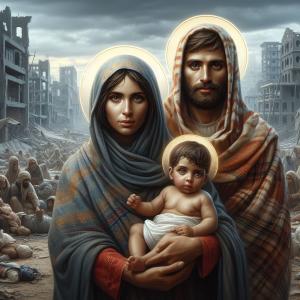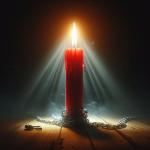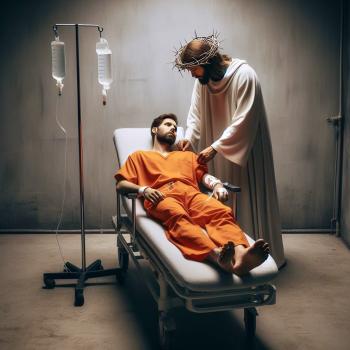
Some Sobering Numbers
Over 8,800 children have been killed in Gaza, Israel, and the West Bank since October.
Let that sit for a moment.
Almost nine thousand children. In a little under three months.
Nobody’s hands are clean when it comes to these deaths. Hamas massacred those Israeli kids (along with over a thousand adults) in October. It’s safe to say that Israel has been entirely too indiscriminate in their response—they have killed twice as many women and children than men. And while a number of those had to be Hamas militants, many of them would have instead been men trying to take care of themselves and their families.
At the same time, however, Hamas has used their civilians as human shields by placing locations of strategic interest and routing their extensive network of tunnels through populated areas and near hospitals or orphanages.
From where I sit, both sides are guilty of war crimes.
Even if they weren’t, whenever armed conflict breaks out it’s innocent civilians who bear the brunt of the pain.
Massacre of the Innocents
This is the sort of world into which Jesus was born.
No, there weren’t bombs exploding and a refugee crisis in the making, but there was a massacre of innocent children—ordered by a ruthless despot, ready to do anything to eliminate any threat to his power. And nobody was safe.
On December 28 every year, the liturgical calendar commemorates the Massacre of the Innocents—when Herod had all the children in and around Bethlehem under the age of two killed (Matthew 2:1-18).
Herod the Great
Remember the story? The Wise Men (astrologers, really) followed a star that they believed would bring them to the place where a powerful King had been born. Given what they knew, it made sense to go to the current king to see what was up. They asked Herod where the King of the Jews had recently been born.
This freaked Herod out because he went by the title “King of the Jews.” It freaked him out even more because he had a bit of a case of imposter syndrome—he supposedly had converted to Judaism but was not Jewish by birth and was certainly not a practicing Jew. In fact, Herod’s palace was well-known as a place of debauchery and excess.
In short, Herod the Great (as he’s known to history) was jealous, paranoid, and insecure.
Exactly what one wants in a ruler, right?
According to Antiquities of the Jews by the ancient Jewish historian Josephus, Herod had two wives, his mother-in-law, and three sons executed at various points during his reign, because he thought there were plots against him. He built the great Masada fortress out in the desert as a place for him to escape in case of insurrection. And when he knew he was nearing the end of his life, he ordered that two thousand men should be killed by his soldiers upon word of his death, to make sure there would be adequate sadness and mourning. Thankfully, this order wasn’t carried out.
Flight Into Egypt
Returning to the Christmas story, Herod tells the Wise Men to find the child and stop by on their way out of town to let him know where to find him. That way, he could pay proper homage to this future king.
Of course by “pay homage to,” he meant “eliminate.” But the Wise Men didn’t know that.
So they find Jesus, give him their gifts, and after being warned in a dream decide not to meet with Herod again, instead heading straight out of town back home.
Right around the same time, Joseph was warned in a dream that he needed to get his family out of there and escape to Egypt. So he did so.
And it’s a good thing, because when Herod found out that the Wise Men had just left, he was furious and frightened, which is an awful combination when you have someone desperate to cling to power. He orders all the children in and around Bethlehem who are two years old and younger to be killed.
History or Plot Device?
Now, there’s some debate as to whether the Massacre of the Innocents was an actual historical event or not. On the one hand, in the Bible, it’s only mentioned in Matthew, and Josephus doesn’t mention it either. On the other hand, Bethlehem was a relatively small town, so for Herod to have a half dozen to a dozen children killed may not have been newsworthy enough to include, especially compared to the other atrocities Herod had committed.
Whether it was historical or a plot device, the bottom line is that the Massacre of the Innocents definitely would have been true to Herod’s character. And it was the very first example of what happens when the humble, life-giving power of God collides with the way the world understands power. Even from the start, Jesus upended expectations of what God was like as the powerful God became humble, and a humble set of young peasant parents, a bunch of shepherds, and foreign astrologers became the greeting party for God in the flesh.
We’re Not Off the Hook
Even today, though, we still experience multiple massacres of the innocents. Innocent children are still being killed in places like the Holy Land and Ukraine. Closer to home, the United States has an abysmal childbirth mortality rate for a country with our resources. Children die from lack of adequate healthcare. LGBTQ+ youth and trans youth especially live every day in danger of violence against them, are denied the right to gender-affirming healthcare, and die by suicide. Thousands of other children every year die by firearms, sometimes by another person and sometimes by suicide.
Israel’s hands are not clean. Hamas’s hands are not clean. And our own hands are not clean either. Especially those of us who profess to follow the Prince of Peace who was humbly born into a violent world to bring life, and who end up being part of the problem instead.













